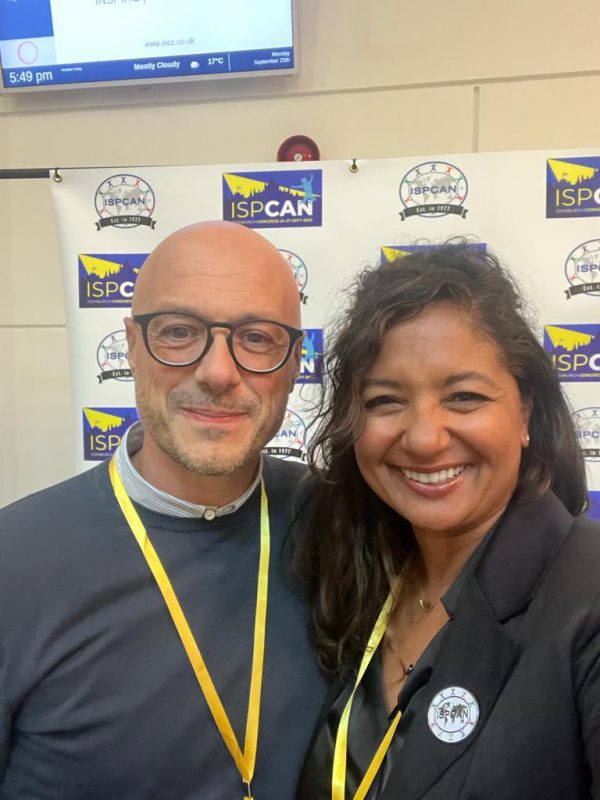ISPCAN Congress 2023. Data and witnesses in focus
di Artemisia

About one month ago, the annual Congress of ISPCAN – International Society for the Prevention of Child Abuse and Neglect – was held in Edinburgh, Scotland. ISPCAN, the leading international organisation dealing with child abuse and maltreatment was founded in 1977 in the United States with the goal of “providing global practitioners at the forefront of research and practice with a learning community and an active network to advance prevention, treatment and collaboration for children’s rights”, as stated on its institutional website.
Today ISPCAN brings together hundreds of experts from all over the world, with the most diverse disciplinary profiles, active across the entire range of child protection and support services, within institutions, civil society, and universities.
Organised by the Childlight Global Child Safety Institute with the support of the Police Service of Scotland, from September 24-27th the ISPCAN Congress gathered around 800 experts from 71 countries, and featured 10 parallel sessions, 6 master classes, and the presentation of 100 posters to illustrate the results of research, pilot projects, experimentations, new services and organisational models, and the launch of the new international journal Child Protection and Practice.
We discuss this with Rocco Briganti, director of Specchio Magico and member of ISPCAN Board of Directors, as well as member of CISMAI, which in turn is ISPCAN Country Partner.

“For those who, like me, arrived on tiptoe, with the excitement of being able to meet, get to know and listen live to some of the most important scholars of child maltreatment and abuse, on whose texts generations of workers and operators have been trained even in Italy, the biggest surprise was undoubtedly that of being immersed in an open and inclusive community” admits Briganti, “with a great desire to make contacts, network, develop projects, in an atmosphere of great curiosity and listening, without preconceived rhetoric to prevent a nourishing exchange.”
The interest aroused by the Italian experiences presented at ISPCAN “gave the measure of how much the work we do in Italy is composed of best practices that still struggle to emerge at the international level, the language barrier being a further hinder. Contexts such as this one [the ISPCAN Congress] increase the awareness of one’s own value and allow to take the time to consolidate knowledge and practices out of the urgency in which we are immersed daily”, Briganti continues.
“Also, one learns to be more evidence-based, that is, to collect and interrogate both quantitative and qualitative data, to tell one’s experiences in a clear way, so as to facilitate the recognition of possible projects and intervention models that can be adapted and replicated in other contexts as well.”
Exchanging experiences, being able to learn from those who have already put approaches and methodologies into practice, has been at the heart of ISPCAN since its founding. On the other hand, Briganti stresses that “we must not forget that there are many countries where our approaches seem very distant, and where we need to start from the founding principles of child protection and safeguarding: ISPCAN is also an opportunity to support researchers, practitioners and activists who are often isolated in their own countries and face imposing cultural battles to promote a different consideration of childhood.”
The key word was therefore collaboration, as it has always been, and even more than ever, being it the first conference in presence since the Covid19 pandemic.
Briganti points out that this spirit also governs the new ISPCAN Knowledge Hub, the platform that “enables the presentation and connection of experiences and practices from around the world so as to create working groups, facilitate transnational collaborative research and enhance the adaptation of best practices”. The posters presented at the Edinburgh congress are already available in the Knowledge Hub.
Key word and central topic of the congress, to which numerous panels, presentations, and round tables were dedicated, were data, intended as a central tool for any advocacy action.
“Data allow the legislators, namely those who define policies for children, to calibrate legislative proposals on the real needs and current dimensions of the phenomenon. In fact, only if you know about child abuse and maltreatment, and therefore recognize its social impact, can you try to prevent it, contain it, counter it more effectively”, Briganti notes. “If you say that 1 in 9 children in Italy has suffered some form of abuse, or that 1 in 3 women has suffered some form of violence, it becomes clear that we are not talking about isolated cases to be dealt with individually, but a social problem that requires systemic interventions”.
Several interventions highlighted that what is needed is a great investment – and a great collective effort at all levels – not only on the front of data collection, but also of defining new indicators to monitor an ever-evolving phenomenon, which today is confronted with new digital technologies, the overexposure of minors to online violence, child pornography, the deep or dark web, and the pervasive impact of social media.
As Briganti points out “This is a global phenomenon, the control of which is very difficult, and which still lacks a meaningful and wide-ranging statistical description that is useful not only to introduce regulations for child protection, but also to provide children, parents and professionals with tools to deal with this scenario that potentially affects the future of all of us”.
In Italy, CISMAI (Coordinamento italiano dei servizi contro il maltrattamento e l’abuso all’infanzia, the Italian Coordination of Services against Child Maltreatment and Abuse) has already done a lot of work in this regard, as evidenced by the various Guidelines published in recent years, for example with the definition and classification of new forms of violence, or with the attention towards witnessing violence or special orphans.
The other major theme, in addition to data, on which there has been a great deal of attention is the voices of the victims, guided by the rationale of being able to witness the effects of child protection in the short, medium and long term and making the first-person narrative become foundational for interventions in terms of policy and services.
“There were from this point of view two very emotional moments: the meeting with Lori Poland and the meeting with Paul Stewart,” Briganti says.
Lori Poland‘s was a very famous case, which in 1983 left the United States and the world with bated breath. Lori was abducted from the backyard of her home when she was only 3 years old, abused and locked in an underground latrine for 3 days. She managed to save herself because some birdwatchers heard her cries and alerted the police. Today Poland is the president of EndCAN, End Child Abuse and Neglect, a U.S.-based organization specializing in trauma prevention and treatment.
“It was Lori Poland who organized ISPCAN’s torchlight procession under the Scottish Parliament to draw institutional attention to child abuse and maltreatment,” Briganti adds.

Paul Stewart was an English midfielder who eventually got to play a few games in the national team jersey as well. But the athlete had a secret that destroyed his sports career: for four years, from the time he was 11, he was abused by his team coach, who had terrorized him by threatening to hurt his parents and little brother if he spoke out. As an adult, and despite his athletic successes, Paul had fallen into addiction to alcohol and drugs in order to cope with mental suffering.
Briganti concludes that “it was after revealing his story in 2016 that Stewart decided to put his experience at the service of prevention, creating a training program specifically aimed at young people who play sports. This is how he was also able to progressively overcome the trauma. Hearing him talk about his experience can be of great encouragement”.
In 2021, CISMAI through the Scientific Direction of Briganti himself, hosted an excellent ISPCAN Congress where Artemisia, Committee of Abandoned Minors by the State in the Forteto and Agevolando presented a so intense workshop with the title “Listening to voices of adult survivors of child abuse in out of home care setting”, related to survivors and institutional maltreatment. This experience has been of great inspiration for ISPCAN members and all the audience, a very strong example of what Briganti told us in this interview.
The next ISPCAN congress has already been scheduled. It will be held August 18-21, 2024, in Uppsala, Sweden.
Ti potrebbe interessare

Servizio sociale, relazione di cura. Intervista a Teresa Bertotti
di Artemisia
Teresa Bertotti è professoressa associata di Servizio Sociale nel Dipartimento di Sociologia e ricerca sociale dell’Università di Trento e fa parte del...

Linee di indirizzo della Rete di Nicoletta: come e perché funzionano
di Artemisia
Marianna Giordano, presidente del CISMAI, Coordinamento italiano dei servizi contro il maltrattamento e l’abuso all’infanzia, ha collaborato alla stesura delle Linee di...

Io e il Secco. Il 19 giugno a Firenze proiezione con Artemisia
di Artemisia
Io e il Secco è la premiata opera prima del regista Gianluca Santoni, che affronta il tema della violenza assistita, ovvero quella...